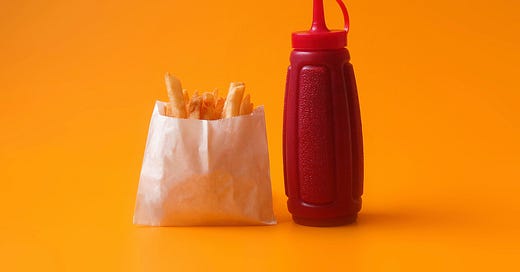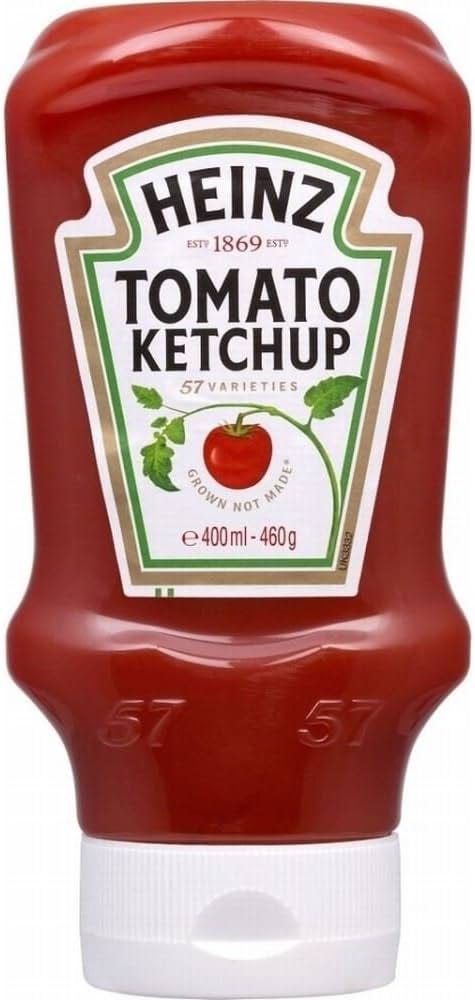I’m not talking about the ketchup sitting in the back of your fridge, its spout covered in a crust you refuse to wipe off after you use it.
I’m talking about the word “ketchup.”
What’s the first thing that comes to mind when you see that word?
Statistically, it’s probably something like this.
The bottle might look a little different in your mind’s-eye (if you’re fancy you might even imagine a glass bottle) but I bet it has that same label on it.
Heinz owns the word ketchup. It’s the first brand most people think of, it’s what most of you reading this have in your fridge right now, and even people who prefer another brand like it because it’s not Heinz. Either because it’s cheaper or it tastes better.
Owning a word is one of the most powerful things a brand can do, according to The 22 Immutable Laws of Marketing, one of the seminal texts in marketing. It’s rule #5 in the book, the law of focus:
The most powerful concept in marketing is owning a word in the prospect’s mind.
If a potential customer automatically thinks of your brand when faced with a specific word, your marketing strategy changes dramatically. It’s the difference between getting in shape when you’ve never even gone on a run in your life and maintaining your current level of fitness after exercising for years.
One’s a lot easier than the other.
Heinz’s domination over the word Ketchup is so overwhelming that they even had a whole campaign about it.
All they did was encourage people to use DALL-E (an AI tool) to generate images of a ketchup bottle. Notice how they all look like Heinz? Because the models behind these AI tools essentially scrape the internet for data and remix it to match the prompt they get, DALL-E had millions of examples of Heinz bottles. So many that it essentially associated the word “ketchup” with Heinz. The same way most people do.
So how can you use this?
Marketers need massive budgets and continuous branding efforts to own a word like this. Freelancers have it a lot easier. After all, the pool of people you need to influence to own a word like this is a lot smaller, and you don’t need to compete with massive companies the way Heinz does.
This is the Big Fish-Little Pond effect, as described in Malcolm Gladwell’s David & Goliath. Basically, the smaller the pond you’re competing in (i.e. your immediate network instead of the entire country) the easier it is to stand out and reap the benefits.
Freelancers are usually dealing with smaller ponds than companies like Heinz. That makes it easier to own a word.
Here’s an example of this.
Between the years of 2012 and 2016, a lot of my summers could be summed up in a single word: moving. There was one particular summer when I must have helped six friends move, doing one a week.
Looking back, it’s pretty clear how this happened. I’d inadvertently become the owner of “moving help” in my friends’ minds. I lifted weights, I had time on my hands, and I was always ready to help.
Imagine if I’d had a truck, too?
All I needed to do to own that term was repeat a certain action, reliably, in a way that demonstrated characteristics that matched the image my friends had of moving help in their minds (ok, maybe “free moving help” would be more accurate).
As a freelancer, you don’t need to do much more work than that to own a relevant word in your network. Think about it this way; who in your network would you go to for design help? What if you had questions about software development? Or you need help sprucing up your resume?
If you can own a term like “freelance writer” within your network, you’ll be the go-to person whenever someone needs writing help. All you need to do is keep working at what you’re doing, do it in public (e.g. write about it on Substack), and stick with it.
How do I know it works?
The vast majority of my business as a freelancer comes from referrals. If that’s not owning a word, I don’t know what is.
Thanks for reading.






